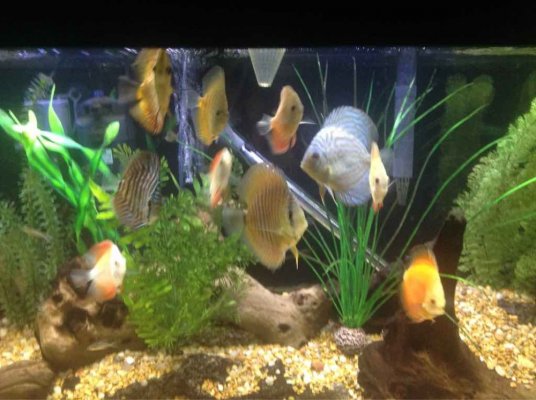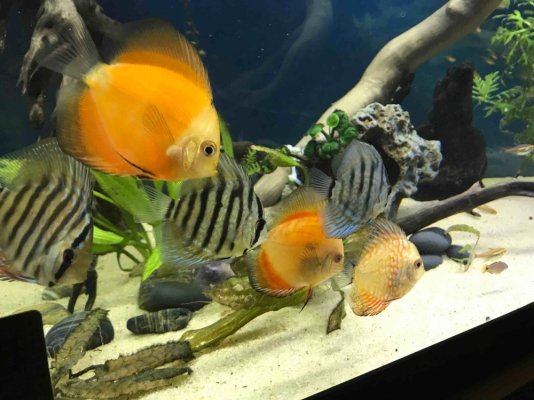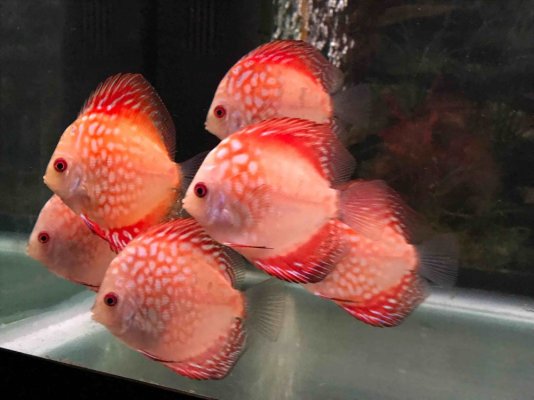herp_mommy
Aquarium Advice Addict
~Quick Facts are in BOLD~
Intro:I've noticed a growing interest in keeping discus on these forms, so I thought I'd give an attempt to a complete care profile. If I'm missing something please chime in! I've only been keeping discus for a few years now, but have learned a lot in the process.
Submitted by: herp_mommy (Tracy)
Common Name: Discus Fish, Pompadour Fish
Scientific Name(s): Symphysodon sp. (Symphysodon discus, S. aequifasciatus, S. haraldi, and S. tarzoo)
There has been a lot of questioning about wild discus being different species, or just different color patterns. The first wild discus was described in 1840 as Symphysodon discus. A few other species and subspecies were described years later, but the distinction between what is what is still difficult to determine.
Category: South American Cichlid
Origin: The rivers of Amazonia
Predominantly a Brazilian fish, but has been unintentionally introduced to Columbia and Peru. "Tefe" discus are named from the Rio Tefe region they come from. Wild discus are, while still beautiful, considerably less colorful than then captive bred varieties, and there are numerous varieties.
Main Ecosystem: Tropical Rivers in Amazonia
The natural habitat of the discus can vary. Usually this changes with the wet and dry seasons of Brazil. Typically, the habitat is shallow, slow moving, slightly acidic (pH of 6.0), soft water. They are found among driftwood and tangled roots, but usually not around rocky areas. Plants found among discus include (but are not limited to) lillies, cabomba, and eleocharis. Although found in several discus aquariums, Amazon swords are only rarely seen where discus are.
Salinity: Fresh Water
Temperament: Calm
Diet: Omnivore.
High protein, Prepared, Frozen foods are best. A varied diet is strongly recommended to give discus all the nutrition they need. Beefheart, pellets (formulated for discus), bloodworms, and brine shrimp are all recommended. Live worms should be avoided, as they can carry several parasites and diseases to your discus. They should ideally be fed several small meals a day, with different items being offered at each feeding. Be careful not to overfeed.
Care: A lot of care goes into discus keeping. Frequent water changes to keep the water quality high are probably the most important things you can do.
pH: 5.5-7.5
It's always best to match the pH that your discus were raised in (or where they're coming from.) Wild discus are more sensitive to pH fluctuations.
Temperature: 84F- 86F
Discus are warm water fish, even warmer than most tropical species. Juveniles do better on the high end, while adults can tolerate the lower end.
Hardness: Soft- Moderately Hard
Discus prefer softer water, although this factor is not as important as temperature or pH. They spawn easier with a low TDS level.
Potential Size: 4"-6"
In most cases, once discus pair up and start to breed they will stop growing to focus their energy into producing and raising fry. Younger discus can be kept in smaller aquariums, but for adults each discus should be given 10 gallons of water.
Swimming Region: middle
Discus will travel all over the aquarium, often picking up the missed food off the bottom of the tank, taking food from your fingers at the surface, and inspecting the many crevasses and areas of your aquarium.
Activity: Diurnal (they sleep at night like people )
)
Make sure no uneaten food is left when the lights are turned off, unless you have other tank inhabitants that will eat it every night.
Lifespan: Possibly up to 10 years
Sadly, many discus meet an early demise due to poor husbandry. If water conditions are kept up to par, they can live long, healthy, active lives.
Color: Varies, most commonly Blue, Red, Green, and Brown.
There are several discus varieties available on the market. Patterns will vary as well.
Sexing: Males are generally more colorful, larger, and have bigger fins than the female, but due to selective breeding for these desirable traits, they can be difficult to sex until they form pairs and the female lays eggs.
Acclimation: GO SLOW.
Drip acclimation is best for discus. If buying discus for an already established aquarium with previous discus inhabitants, quarantine is STRONGLY recommended.
Breeding: Seen with old enough discus and stable enough parameters.
Discus will breed as long as they are eating well, happy, and healthy. The parents (while sometimes not perfect parents the first time) will raise their fry themselves. The parents produce a secretion from their skin which the young fry feed off of until they are big enough to stray away and try what the parents are eating.
Diseases: Prone to HITH, nutritional deficiencies.
Hole in the Head disease can be a problem for discus is water quality is not good enough. Internal parasites can also cause an early demise. As the saying goes, an "ounce of prevention is worth a pound of cure"
Other Comments:
-Keeping discus on a dark substrate will result in "peppering" (fishy freckles) Only effects the image of the fish, not harmful, but not desirable in prime specimens.
-Avoid purchasing discus that are "on sale" (by this I mean a lower price than other discus, not store-wide coupons or events), avoid discus that prefer to be alone, have clamped fins, who are not eating, etc.
-Purchasing direct from breeders is always recommended.
-Learn how to spot problems as early as possible and correct them.

Jeffrey Senske
Sources:
1) Giovanetti, Thomas A., and Oliver Lucanus. Discus Fish. New York: Barron's, 2005. Print.
2) Hargrove, Mic, Maddy Hargrove, and David Brown. The Discus: An Owner's Guide to Happy Healthy Fish. Foster City, CA: Howell Book House, 2000. Print.
3) Wattley, Jack. Discus Breeding for Beginners: Challenging but Rewarding. Neptune City, NJ: T.F.H., 2000. Print.
4) Untergasser, Dieter. Discus Health: Selection, Care, Diet, Diseases & Treatments for Discus, Angelfish, and Other Cichlids. Neptune City, NJ: T.F.H. Publications, 1991. Print.
Intro:I've noticed a growing interest in keeping discus on these forms, so I thought I'd give an attempt to a complete care profile. If I'm missing something please chime in! I've only been keeping discus for a few years now, but have learned a lot in the process.
Submitted by: herp_mommy (Tracy)
Common Name: Discus Fish, Pompadour Fish
Scientific Name(s): Symphysodon sp. (Symphysodon discus, S. aequifasciatus, S. haraldi, and S. tarzoo)
There has been a lot of questioning about wild discus being different species, or just different color patterns. The first wild discus was described in 1840 as Symphysodon discus. A few other species and subspecies were described years later, but the distinction between what is what is still difficult to determine.
Category: South American Cichlid
Origin: The rivers of Amazonia
Predominantly a Brazilian fish, but has been unintentionally introduced to Columbia and Peru. "Tefe" discus are named from the Rio Tefe region they come from. Wild discus are, while still beautiful, considerably less colorful than then captive bred varieties, and there are numerous varieties.
Main Ecosystem: Tropical Rivers in Amazonia
The natural habitat of the discus can vary. Usually this changes with the wet and dry seasons of Brazil. Typically, the habitat is shallow, slow moving, slightly acidic (pH of 6.0), soft water. They are found among driftwood and tangled roots, but usually not around rocky areas. Plants found among discus include (but are not limited to) lillies, cabomba, and eleocharis. Although found in several discus aquariums, Amazon swords are only rarely seen where discus are.
Salinity: Fresh Water
Temperament: Calm
Diet: Omnivore.
High protein, Prepared, Frozen foods are best. A varied diet is strongly recommended to give discus all the nutrition they need. Beefheart, pellets (formulated for discus), bloodworms, and brine shrimp are all recommended. Live worms should be avoided, as they can carry several parasites and diseases to your discus. They should ideally be fed several small meals a day, with different items being offered at each feeding. Be careful not to overfeed.
Care: A lot of care goes into discus keeping. Frequent water changes to keep the water quality high are probably the most important things you can do.
pH: 5.5-7.5
It's always best to match the pH that your discus were raised in (or where they're coming from.) Wild discus are more sensitive to pH fluctuations.
Temperature: 84F- 86F
Discus are warm water fish, even warmer than most tropical species. Juveniles do better on the high end, while adults can tolerate the lower end.
Hardness: Soft- Moderately Hard
Discus prefer softer water, although this factor is not as important as temperature or pH. They spawn easier with a low TDS level.
Potential Size: 4"-6"
In most cases, once discus pair up and start to breed they will stop growing to focus their energy into producing and raising fry. Younger discus can be kept in smaller aquariums, but for adults each discus should be given 10 gallons of water.
Swimming Region: middle
Discus will travel all over the aquarium, often picking up the missed food off the bottom of the tank, taking food from your fingers at the surface, and inspecting the many crevasses and areas of your aquarium.
Activity: Diurnal (they sleep at night like people
Make sure no uneaten food is left when the lights are turned off, unless you have other tank inhabitants that will eat it every night.
Lifespan: Possibly up to 10 years
Sadly, many discus meet an early demise due to poor husbandry. If water conditions are kept up to par, they can live long, healthy, active lives.
Color: Varies, most commonly Blue, Red, Green, and Brown.
There are several discus varieties available on the market. Patterns will vary as well.
Sexing: Males are generally more colorful, larger, and have bigger fins than the female, but due to selective breeding for these desirable traits, they can be difficult to sex until they form pairs and the female lays eggs.
Acclimation: GO SLOW.
Drip acclimation is best for discus. If buying discus for an already established aquarium with previous discus inhabitants, quarantine is STRONGLY recommended.
Breeding: Seen with old enough discus and stable enough parameters.
Discus will breed as long as they are eating well, happy, and healthy. The parents (while sometimes not perfect parents the first time) will raise their fry themselves. The parents produce a secretion from their skin which the young fry feed off of until they are big enough to stray away and try what the parents are eating.
Diseases: Prone to HITH, nutritional deficiencies.
Hole in the Head disease can be a problem for discus is water quality is not good enough. Internal parasites can also cause an early demise. As the saying goes, an "ounce of prevention is worth a pound of cure"
Other Comments:
-Keeping discus on a dark substrate will result in "peppering" (fishy freckles) Only effects the image of the fish, not harmful, but not desirable in prime specimens.
-Avoid purchasing discus that are "on sale" (by this I mean a lower price than other discus, not store-wide coupons or events), avoid discus that prefer to be alone, have clamped fins, who are not eating, etc.
-Purchasing direct from breeders is always recommended.
-Learn how to spot problems as early as possible and correct them.

Jeffrey Senske
Sources:
1) Giovanetti, Thomas A., and Oliver Lucanus. Discus Fish. New York: Barron's, 2005. Print.
2) Hargrove, Mic, Maddy Hargrove, and David Brown. The Discus: An Owner's Guide to Happy Healthy Fish. Foster City, CA: Howell Book House, 2000. Print.
3) Wattley, Jack. Discus Breeding for Beginners: Challenging but Rewarding. Neptune City, NJ: T.F.H., 2000. Print.
4) Untergasser, Dieter. Discus Health: Selection, Care, Diet, Diseases & Treatments for Discus, Angelfish, and Other Cichlids. Neptune City, NJ: T.F.H. Publications, 1991. Print.



